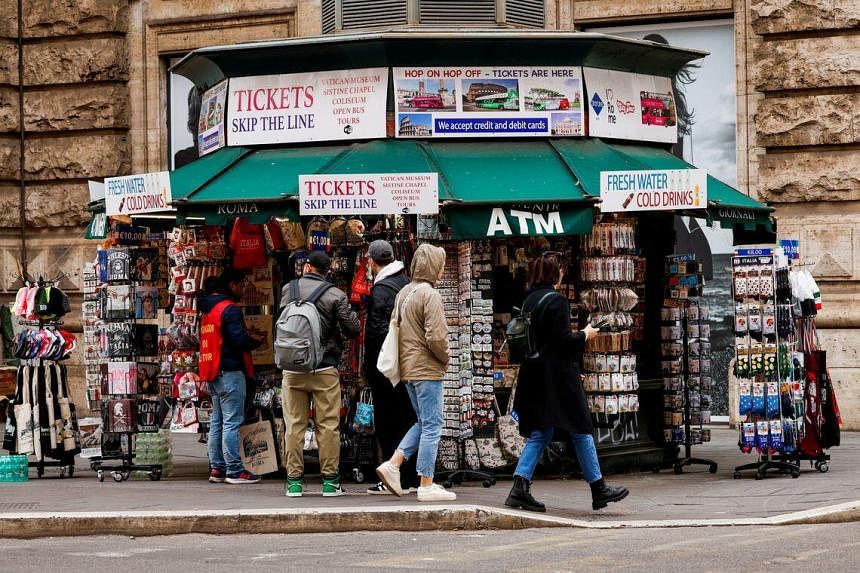ROME - Mr Fabiano Pompei’s family has run a news kiosk close to Rome’s imposing St. John Lateran Basilica since 1948 while the one owned by Mr Marco Volpini’s family near the Trevi Fountains has stood for a century.
Both used to be thriving businesses, but a prolonged slump in newspaper sales has forced Mr Pompei and Mr Volpini to pull down their metal shutters for one last time – like thousands of other kiosk owners across Italy.
“You can make sacrifices up to a certain point, but if you’re earning little or even losing money, it is better to close and do something else, even if it hurts inside,” the 30-year-old Mr Pompei told Reuters.
Mr Volpini had only recently taken over his tiny newsstand from his elderly father, but soon realised he could not make ends meet. “In five years there won’t be any kiosks left. People will get all their information off phones,” he said.
The industry body Snag estimates that two-thirds of Italy’s news kiosks have closed down over the past two decades, leaving only around 12,000 in business today.
The Italian Chamber of Commerce said in a report in January that in the last four years alone 2,700 kiosks had closed, a drop of 16 per cent nationwide, with Rome registering a 21 per cent fall.
At the heart of the crisis lies the plunge in newspaper sales, which represent the bulk of kiosk revenues.
In 2004, around 9.54 million newspapers were sold each day in kiosks, according to data from ADS, the firm which tracks editorial sales. By 2014, that number had dropped to 2.6 million, falling again to around 950,000 by January 2024.
“The decline in newspaper circulation is on a very stable downwards track. It has been going on for decades and there is no sign it will change,” said Alessio Cornia, assistant professor at Dublin City University specialised in journalism.
Changing times
While editors can hope to prop up their sinking revenues by shifting readers online, the kiosk owners are having a much tougher time reinventing themselves.
Mr Stefano di Persio runs a kiosk in the centre of Rome, next to the offices of the city’s largest newspaper, Il Messaggero. He used to sell hundreds of papers each day, now he shifts fewer than 50. “It is a joke,” he told Reuters, without laughing.
His classic, octagonal newsstand is festooned with tourist trinkets, such as fridge magnets, aprons and calendars featuring handsome priests. A handful of newspapers are tucked away for old-time locals not yet pushed out by the invading tourists.

“Most Romans have left this neighbourhood and have been replaced by tourists, so we sell souvenirs. If we had to rely on newspaper sales, we would have closed long ago,” he said.
The government is offering incentives this year worth up to 2,000 euros (S$2,916) to try to halt the haemorrhage, but kiosk owners say the cash will only provide a short-term balm and do nothing to solve long-term trends.
Looking to cut costs, one of Rome’s most famous newsstands, a stone’s throw from the prime minister’s office, turned into an automatic newspaper distribution machine in January, doing away with the need to pay for someone to hand over copies in person.
Many locals lament the changing times. Kiosks are the cement that help hold their communities together, places to gossip about politics, soccer and the weather.
When Mr Pompei briefly opened his kiosk this week to show Reuters the empty shelves, old friends swiftly gathered round hoping he had had a change of heart. They were disappointed.
“This is the second newsstand in the neighbourhood to close. It is a tragedy,” said Eufemia Curci, a retired teacher. “It is a great failure of our culture. People don’t read, they just look at their phones. It is sad.”
Mr Pompei had tried to develop his news stand into a small book store, but turnover never took off, and he was still having to get up every morning at 4.30am to take in the morning editions, starting a work day that ran until 8pm.
“Every night I dream about my kiosk because it is in my heart ... but I couldn’t carry on,” he said. REUTERS

